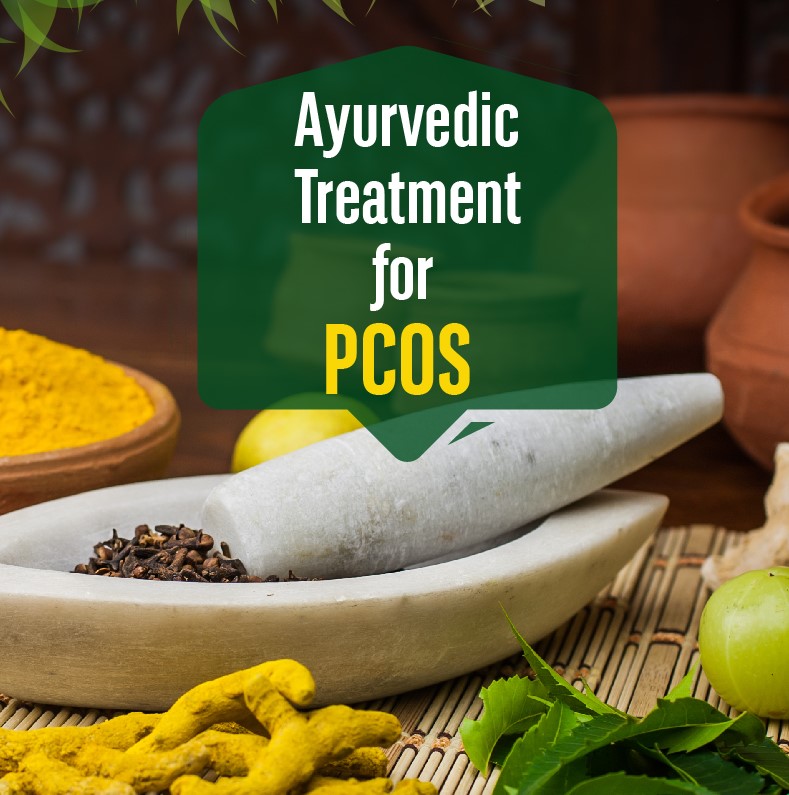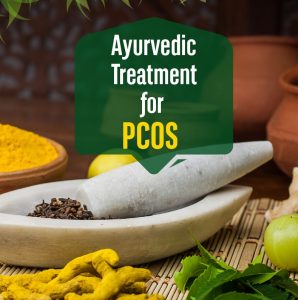About 5-12% of women in the population have polycystic ovary syndrome (PCOS), a female endocrine condition that affects them during their reproductive years. It can result in infertility and is usually affected by obesity and menstruation irregularity. Because it manifests complexly in numerous organs, it is referred to as a disorder.
As soon as possible, PCOS should be treated. Early detection and prompt treatment help prevent complications and chronicity. A delayed diagnosis could cause serious problems. Ayurvedic treatment for PCOS is treated effectively and falls under Yoni Vyapat (utero vaginal problems).
Table of Contents
ToggleWhat Causes PCOS?
PCOS develops when a hormonal imbalance hampers an ovarian cycle’s follicular growth. The afflicted ovarian follicle doesn’t burst and release an egg; instead, it stays inside the ovary. Cysts are the resultant growth of the follicle, and multiple new cysts may manifest throughout every reproductive cycle. Polycystic ovarian syndrome gets its name from the Latin word for many, poly.
Any sickness is viewed as an imbalance in the venerable science of Ayurveda. PCOS is categorized as a Kapha condition in Ayurveda. The organ in the female anatomy that controls reproduction is the arthava dhatu, and the passageway where the ovarian fluid travels is the artavavaha srota. PCOS develops when excessive Kapha disrupts the usual, balanced flow of these liquids and pathways. The PCOS symptoms are accompanied by restricted mobility and poor metabolism.
The leading causes of PCOS are poor nutrition and lifestyle choices, such as mental stress, lack of exercise, and extended and excessive use of hormonal birth control tablets.
Symptoms of PCOS
The most typical signs of PCOS are:
- Period irregularities: Since ovulation is absent, the uterine lining does not shed every month.
- Extreme bleeding: Because the uterine lining is thicker than usual, the periods would be extended more than expected.
- Hair development: About 70% of these women grow hair on their cheeks and bodies, particularly on their backs, bellies, and breasts. Excessive hair growth is known as hirsutism.
- Acne: Due to male hormones, the skin might get higher than usual and erupt in places like the face, chest, and back.
- Overweight: Near to 80% of PCOS-afflicted females are overweight or obese.
- Male-pattern baldness: The scalp’s thinner skin falls off.
- Skin darkening: Dark areas of skin can appear in body parts including the crotch, under the breasts, and the nose.
- Headaches: In some women, hormonal changes might result in headaches.
Types of Ayurvedic Treatment for PCOS
Ayurveda suggests a holistic approach to treating PCOS. The goal of personalized therapy is to balance the body and address the underlying cause of the problem.
The following procedures are used in ayurvedic PCOS treatment:
- body cleansing using Ayurveda
- strengthening and reviving the female reproductive system
- the hormonal imbalance being corrected
- addressing insulin resistance and obesity
Panchakarma is the primary line of PCOS treatment in Ayurveda. After a comprehensive assessment, the Ayurveda professional develops a customized plan.
Removing toxins from reproductive organs using panchakarma treats the underlying cause:
Panchkarma Therapy for PCOS
The rising PCOS problem of the modern era has a clear answer in the form of “Panchakarma” therapy from Ayurveda. The uterus, female vagina, ovaries, Fallopian tubes, and male testicles gain strength during panchakarma therapy. Panchakarma therapy maintains the hormone balance. Ayurvedic panchakarma helps get pregnant easy and is straightforward for couples.
Ayurvedic medicines include,
- Basti: Herbal oil or decoction is administered by rectal enema. A variety of health issues can be brought on by vitiated “Vata.” Basti clears obstructions in Vata Dosha’s path, which regulates the naturally occurring “Vata” phenomena. Various herbal oils, Ghruta, milk, or decoctions are employed during Basti treatments. If the right treatments are used to treat them, miracles might happen.
- Uttarbasti: For gynaecological disorders, Uttarbasti appears as the most successful therapy. It removes the cyst inside the ovarian areas more effectively than oral drugs due to the subsequent impacts on the ovary and uterus. Additionally, it promotes follicular maturity, calms the vitiated Apana Vayu, and cleanses and flushes the Aartava Vaha Srotas.
- Virechan: It removes bodily impurities called ‘Pitta’ vitiated. In addition to other Pitta organs, the washing occurs in the small intestine. In this instance, gastrointestinal transit-enhancing drugs are enhanced for dosha removal through the rectum. It functions similarly to “Vaman Karma” by maintaining hormonal balance.
- Vamana: Cleaning method mainly designed to remove the vitiated “Kapha.” This drug-induced emetic process is painless and primarily carried out in Vasant Rhitu.
- Fertility Massage: It is possible to keep the uterus operating normally by massaging the lower abdomen in a specific pattern with strength and softness. Additionally, a fertility massage decreases abdominal pressure and improves pelvic blood flow.
Conclusion
Ayurvedic treatment for PCOS focuses primarily on fertility support to aid in naturally becoming pregnant. Visit Prakash Nethralaya for the best ayurvedic care if you need your PCOS symptoms to be resolved.







